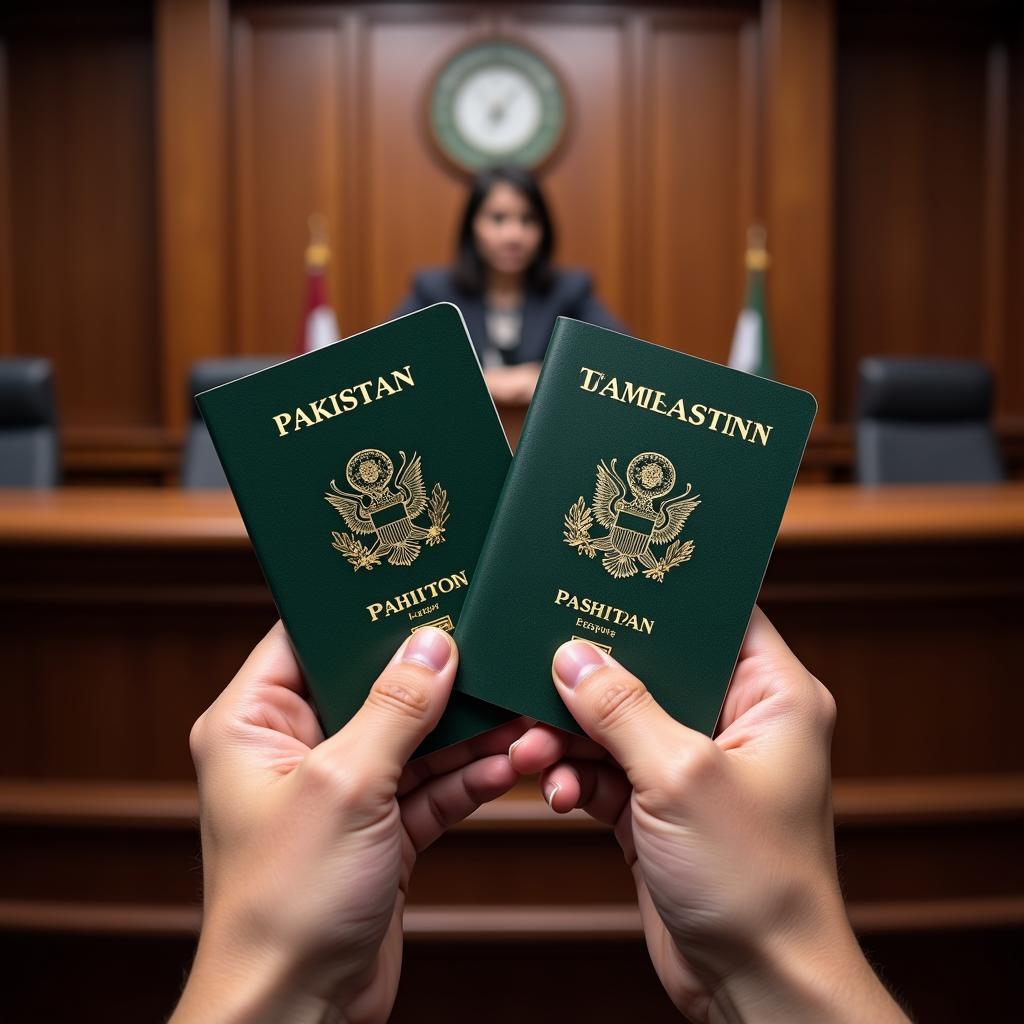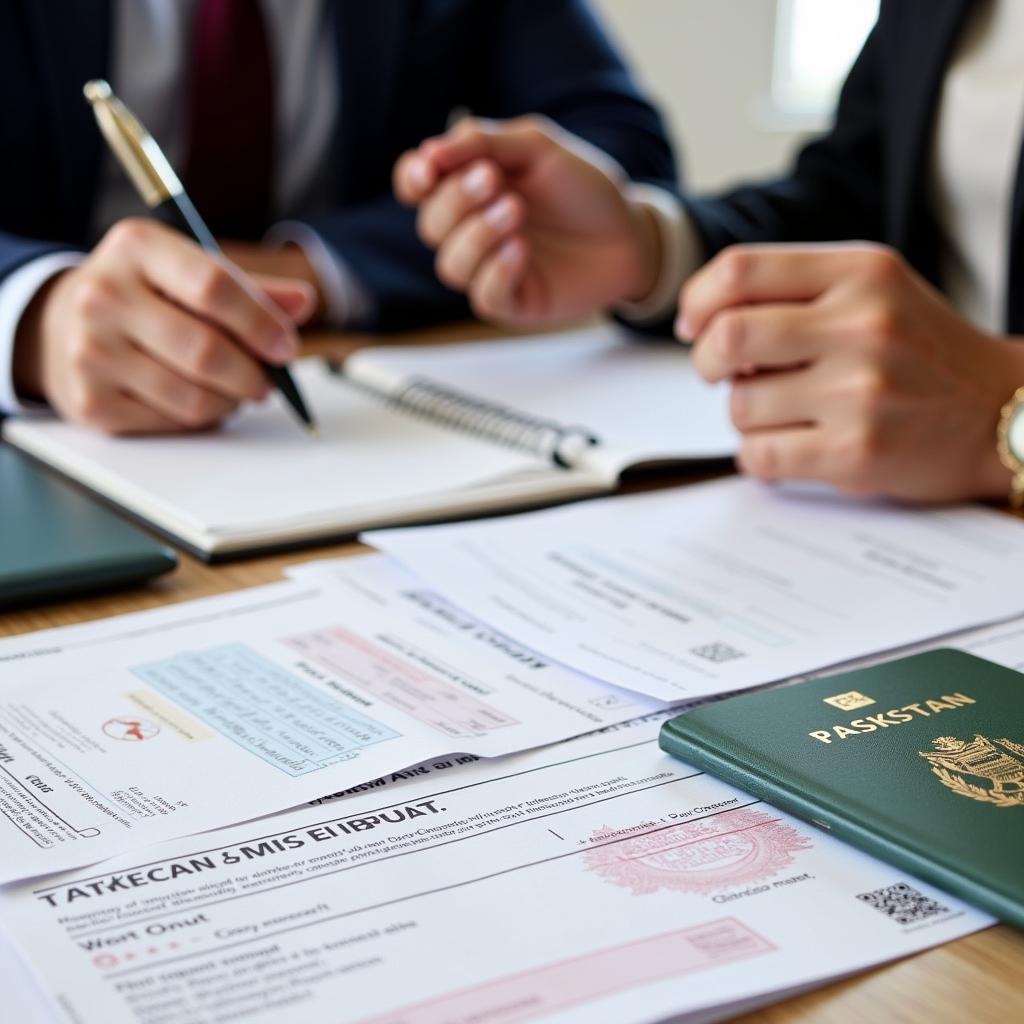Dual nationality cases in Pakistan are a complex and often confusing area of law. This article aims to provide a comprehensive overview of the legal framework, challenges, and frequently asked questions surrounding dual nationality in Pakistan.
 Dual Nationality Challenges in Pakistan
Dual Nationality Challenges in Pakistan
Understanding Dual Nationality Law in Pakistan
Pakistan’s stance on dual nationality is intricate, allowing it in certain circumstances but with specific restrictions. It’s crucial to understand the nuances of the Citizenship Act, 1951, and subsequent amendments to navigate this legal landscape effectively. For example, dual nationality is generally permitted with certain countries listed in the Act, while it is restricted with others like India. Furthermore, individuals acquiring Pakistani citizenship through descent or registration may face different regulations compared to those acquiring it through naturalization. This nuanced approach necessitates careful consideration of individual circumstances. Holding dual nationality can impact an individual’s rights and obligations in Pakistan, including eligibility for certain government positions and political participation. For those considering or currently holding dual nationality, it’s vital to seek expert advice to ensure compliance with Pakistani law. Applying for Pakistani citizenship while already a citizen of another country involves specific procedures and documentation requirements, further emphasizing the need for professional guidance. You may find useful information relating to government positions in our article about bs english government jobs in pakistan.
Who is Eligible for Dual Nationality in Pakistan?
Eligibility criteria for dual nationality in Pakistan vary depending on several factors, including the other country of citizenship. For instance, a Pakistani citizen can hold dual nationality with a British citizen but not with an Indian citizen. The process of acquiring dual nationality often involves navigating bureaucratic procedures and fulfilling specific requirements. These requirements can include providing documentation proving citizenship of both countries, fulfilling residency requirements, and undergoing background checks.
 Dual Nationality Application Process in Pakistan
Dual Nationality Application Process in Pakistan
Challenges Faced by Dual Nationals in Pakistan
Dual nationals in Pakistan often encounter specific challenges. These may include issues with taxation, property ownership, and inheritance laws. They may also face challenges when traveling between countries, requiring different visas or entry permits depending on their nationality. Another important aspect to consider is the political implications of dual nationality, particularly during elections or when holding public office. Dual nationals might also face scrutiny and additional checks at immigration points, sometimes leading to delays and inconvenience. Navigating these complexities requires a thorough understanding of the legal frameworks in both countries.
How Does Dual Nationality Affect Political Participation?
Dual nationality can significantly impact political participation in Pakistan. While dual nationals are generally eligible to vote, they are often restricted from holding certain public offices, including key positions in the government and military. These restrictions are in place to safeguard national interests and prevent potential conflicts of interest. There are ongoing debates surrounding these restrictions, with some advocating for greater inclusivity and others emphasizing the importance of prioritizing national loyalty. Understanding these political implications is crucial for dual nationals seeking to engage in Pakistan’s political landscape.
Common Misconceptions about Dual Nationality in Pakistan
Several misconceptions surround dual nationality in Pakistan, often leading to confusion and misinformation. One common misconception is that holding dual nationality automatically grants individuals equal rights and privileges in both countries. This is not always the case, as each country has its own laws and regulations governing the rights of its citizens, regardless of their other nationalities. Another misconception is that dual nationality makes it easier to avoid legal obligations in either country. In reality, dual nationals are subject to the laws of both countries and can be held accountable in either jurisdiction. Clarifying these misconceptions is essential for promoting a more accurate understanding of dual nationality and its implications. For further information on scholarships, our article about diya pakistan scholarship form 2019 might be helpful.
Conclusion: Navigating the Dual Nationality Landscape
Understanding the complexities of dual nationality cases in Pakistan requires careful consideration of the legal framework, potential challenges, and prevailing misconceptions. By seeking expert advice and staying informed about relevant regulations, individuals can navigate this complex landscape effectively. While dual nationality offers certain advantages, it also comes with specific responsibilities and limitations. It is essential for individuals to weigh the pros and cons carefully and make informed decisions based on their individual circumstances and long-term goals. Being aware of the potential challenges and misconceptions can help dual nationals avoid legal complications and ensure a smooth transition between their countries of citizenship. The issue of dual nationality in Pakistan continues to evolve, and staying updated on the latest developments is crucial for both current and prospective dual nationals.
FAQ about Dual Nationality in Pakistan
- Can I lose my Pakistani citizenship if I acquire another nationality? Not necessarily. It depends on the specific laws and agreements between Pakistan and the other country.
- Do I need to renounce my other citizenship to become a Pakistani citizen? In most cases, no. Pakistan allows dual nationality with certain countries.
- How can I apply for dual nationality in Pakistan? The application process involves submitting specific documentation to the relevant authorities and fulfilling certain requirements.
- What are the tax implications of holding dual nationality in Pakistan? Dual nationals may be subject to tax laws in both countries. It’s crucial to understand the tax treaties and regulations to avoid double taxation.
- Can I own property in Pakistan if I am a dual national? Yes, generally dual nationals can own property in Pakistan.
- Can I work in the Pakistani government with dual nationality? Certain government positions may be restricted for dual nationals.
- Can I vote in Pakistani elections if I am a dual national? Yes, generally dual nationals are eligible to vote in Pakistani elections.
Other Questions and Related Articles
Do you have other questions about sub inspector qualifications? Our article on sub inspector qualification in pakistan provides detailed information.
Contact Us for Assistance with Dual Nationality Cases
Need help navigating the complexities of dual nationality in Pakistan? Our team is here to assist you. Contact us at Phone: +923337849799, Email: [email protected] or visit our office at Dera Ghazi Khan Rd, Rakhni, Barkhan, Balochistan, Pakistan. We offer 24/7 customer support.